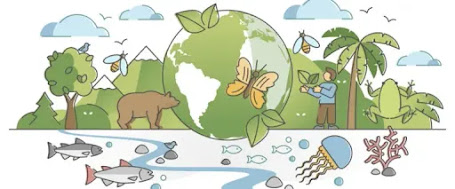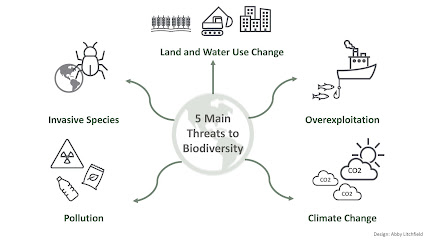-- Biodiversity --
"The variety of life in the world or in a particular habitat or ecosystem"
--------------------------------------------------------------------------------------------------------------------------------
Why do we need it?
As said Biodiversity is a term that refers to all living things, the word "Biodiversity" is a shortened word for "biological diversity". We look at both on a global scale, since there are still many species to be discovered and in a single area, an ecosystem, such as the tundra, rainforest, and plains. Biodiversity has several levels starting with genes, specific species, groups of creatures, and finally the ecosystem The more significant the diversity the more ideal ecosystem conditions are to encourage plant growth in warm and wet climates.
Biodiversity is crucial for humans to exist, with all species working together it provides the grass cows eat, in turn giving humans food. Medicine is found in fungi growing on sloths to help fight cancer and bacteria-causing illnesses. As well as Shelter, fuel, and air. Biodiversity involves all living things such as plants which make the air we breathe or bees pollinating and making fruits. It also holds significance to groups of people whether it be for religious or spiritual reasons, it's said that "biodiversity can inspire spiritual feelings of humility, communion, awe, wonder, and inter-relatedness with nature" (Springer). It offers many things, humans have yet to discover, such as new services or medicine. Not to mention, biodiversity regulates climate- with tones of trees absorbing 48 pounds of carbon dioxide not to mention the ocean that absorbs even more than that- purifies water, controls pests, pollination, and seed dispersal.
 |
| How water is purified by biodiversity |
--------------------------------------------------------------------------------------------------------------------------------
Threats to Biodiversity ?!?
Over the past years, humans have grown as a population and have dominated the planet. Causing much of the earth's biodiversity to be disturbed or even having ecosystems destroyed due to human activity. Due to the major loss of biodiversity across the worked, this is seen as a crisis that is equally, or more important than climate change. For example, with the extinction of animals rapidly increasing, it's no surprise that humans' footprint has been more present on Earth. On the IUCN red list- a "Critical indicator of the health of the world's Biodiversity" (IUCN)- they have more than 150,300 on the list with more than 42,100 species facing the threat of extinction. Mass extinction can come sooner than later as Climate Change and the increased amount of CO2 in the air hurt wildlife. As populations are rapidly increasing keeping up with new demands results in overfishing, tearing down forests,
destroying wildlife homes to build factories or houses, what we eat, pollution, and hunting have all damaged our biodiversity. Since humans can't breathe underwater, you'd think our oceans would be healthy. however, that's not the case, since new technology for more "efficient" fishing and just the overall demand for it. Overfishing has been a problem for continuous years. As the ocean's biodiversity declines, the ocean's health starts declining as well removing a crucial factor of regulating the Earth's climate. What you eat also has effects, bats, pangolins, tigers, and other mammals are being eaten out of existence. while rhinos, elephants, gorillas, and others are being poached whether for food or profit. Pollution by air or water has extreme effects on the ecosystem.
For Example, dead zones. These zones are created by an excessive amount of nutrients in the water, promoting the growth of algae at high rates. these algae blooms consume all the oxygen and block sunlight from underwater plants. When the algae dies all of the oxygen has been sucked out, making it impossible for aquatic life to survive. Not to mention that pollutants like sulfur can lead to levels of acid in lakes and damage forest soil and trees. Finally, habit loss is the biggest reason why animals go extinct. Habit loss is either intentional changes, like wildfire, or intentional changes, like building new houses. when wildlife goes through habit loss its population starts to decline and eventually goes extinct. Each of these examples is a huge threat to our biodiversity, they all affect the well-being of our wildlife by putting them endangered or killing them till extinction.
--------------------------------------------------------------------------------------------------------------------------------

What can we do?
As we've established biodiversity is plants, animals, and microorganisms. This is a great thing because when we do provide the best environment to promote growth and diversity. Then our biodiversity will skyrocket, and plants, animals, and fish species come back easily. Here's the answer: Leave Them Alone :0. Seriously only 12% of our land in the U.S. is protected- land that is federally protected because of its biodiversity, cultural significance, or natural resources- With only 8% of our oceans being protected. One option is to enlarge the amount of land/ocean we decide to protect, some say that protecting half of our land/ocean is the way to go. However, this comes with a problem we must look out for, if we decide to protect half of the earth we would need to do so in a way that doesn't disturb people's ability to live, which is getting increasingly hard as the population grows. This is why we should promote more cities that have numerous stores, jobs, and other necessities a mile away this lowers the need to expand onto more land. On that same note, lots of land is being cleared for cattle, palm oil, corn, and more. Eating with a more conscious mind will help a great amount, supporting local farmers or eating less meat more specifically cattle will lower the demand/need to expand more. Eating more consciously also includes our marine life. The demand for seafood, since it's so cheap due to the government subsiding it, is causing overfishing one of the leading causes of the depletion of our marine population. These more "efficient" ways to fish- bottom trawling- only result in damaging our ocean floor and catching large amounts of bycatch, whilst only getting a small amount of the targeted fish. Having stricter fishing laws or eating less fish is a great way to allow our marine life to bounce back. Second, poaching. Poaching is a huge problem around the world, it's why elephants and rhinos are endangered, not to mention all types of whales and some sharks are being hunted to extinction as well. We would need to reduce the demand that these endangered animals are getting and get the public to care about these animals going extinct. We should be funding organizations that help protect endangered animals. Third, pollution. Pollution is one of the biggest contributors as to why we are losing biodiversity. Lowering pollution can be easy, having more public transportation allowing for less, building walkable places, or you could start walking instead of driving all of these options will lower the amount of CO2 that is released into the air, affecting our oceans, plants, and flying wildlife. Or having those in the agricultural business be more attentive and not allow run-off to get into lakes or streams promoting the overgrowth of algae. Also, pesticide run-off used in the agriculture industry can be extremely toxic to marine life, a quick fix is to stop using them. The demand is what matters if we are able to lower demand for multiple things we can have an easier time promoting biodiversity back to its peak. Which wouldn't be hard.
--------------------------------------------------------------------------------------------------------------------------------
Work Cited
“6 Ways to Preserve Biodiversity.” Yale Sustainability, 1 Oct. 2020, sustainability.yale.edu/blog/6-ways-preserve-biodiversity.
“Biodiversity.” Education, education.nationalgeographic.org/resource/biodiversity/. Accessed 6 June 2023.
EPA, www.epa.gov/eco-research/ecosystems-and-air-quality#:~:text=For%20example%3A%20pollutants%20such%20as,affects%20scenic%20vistas%20in%20protected. Accessed 6 June 2023.
EPA, www.epa.gov/nutrientpollution/effects-dead-zones-and-harmful-algal-blooms#:~:text=Dead%20zones%20are%20areas%20of,excess%20nutrients%20from%20upstream%20sources. Accessed 6 June 2023.
Hanski, Ilkka. “Habitat Loss, the Dynamics of Biodiversity, and a Perspective on Conservation.” Ambio, May 2011, www.ncbi.nlm.nih.gov/pmc/articles/PMC3357798/#:~:text=Habitat%20loss%20leaves%20large%20numbers,(Hanski%20and%20Ovaskainen%202002).
“The IUCN Red List of Threatened Species.” IUCN Red List of Threatened Species, www.iucnredlist.org/about/background-history#:~:text=Currently%2C%20there%20are%20more%20than,mammals%20and%2013%25%20of%20birds. Accessed 6 June 2023.
Ministry of Environment and Climate Change Strategy. “What Causes an Algae Bloom?” Province of British Columbia, 13 June 2022, www2.gov.bc.ca/gov/content/environment/air-land-water/water/water-quality/algae-watch/what-are-algae/causes-of-an-algae-bloom#:~:text=Algae%20blooms%20can%20occur%20when,%2C%20and%20stable%20wind%20conditions).
One Tree Planted. “12 Ways to Prevent Biodiversity Loss.” One Tree Planted, onetreeplanted.org/blogs/stories/conserving-biodiversity. Accessed 6 June 2023.
“What Is Biodiversity and Why Does It Matter to Us?” The Guardian, 12 Mar. 2018, www.theguardian.com/news/2018/mar/12/what-is-biodiversity-and-why-does-it-matter-to-us.
“What Is Biodiversity? Why Is It Important?: AMNH.” American Museum of Natural History, www.amnh.org/research/center-for-biodiversity-conservation/what-is-biodiversity. Accessed 6 June 2023.
“What Is Biodiversity?” WWF, www.worldwildlife.org/pages/what-is-biodiversity. Accessed 6 June 2023.
“Why Do Animals and Plants Become Endangered?” Why Do Animals and Plants Become Endangered? | U.S. Geological Survey, www.usgs.gov/faqs/why-do-animals-and-plants-become-endangered#:~:text=Habitat%20loss%20is%20the%20primary,and%20the%20spread%20of%20diseases. Accessed 6 June 2023.









Comments
Post a Comment